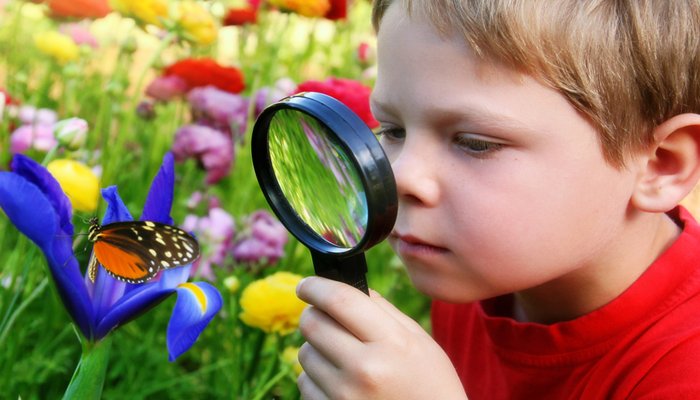The child, like all living organisms, goes through a number of developmental stages. Dr. Montessori calls these stages “sensitive periods”. These “sensitive periods” exist in the child, who is a universal organism, regardless of race or culture. In a certain period of sensitivity, the child hungers with an insatiable enthusiasm for a certain knowledge or skill. Various inner sensitivities of the child help him choose what is useful and necessary for him from his complex environment. It causes the child to be sensitive to some things and indifferent to others. When a certain sensitivity awakens in the child, he limits the world to the abilities he aims at, like a light that illuminates some things and leaves others in the dark.
During this sensitivity period, the child learns to adapt himself to the environment and gain new conquests and successes. These periods are like a beam of light that illuminates the interior or a battery that provides energy. It is this sensitivity that brings the child into particularly intense contact with the outside world. In these times, everything is easy. There is nothing that cannot be done, life is ecstasy throughout. Every effort increases his strength a little more. When one of these spiritual passions is exhausted, another flares up. Thus, childhood runs from one success to the next with an unfailing rhythm. This is what provides the happiness and joy of the child. The child is endowed with an inner experience that enables him to take his astonishing breakthrough in natural conquest, but when faced with an obstacle standing against his efforts in this sensitive period, he is shaken, his personality is traumatized, distorted. This is a mental disability about which we still have little knowledge, but which our child suffers in adulthood. It should not be forgotten that if the sensitivity phase has passed, other gains can only be achieved by reflection, with great administrative power, effort and difficulty, and this turns into a tiring work due to atrophy.
When children’s activities are stopped by external obstacles, it is remarkable that they show harsh and destructive reactions. Desperate complaints occur, which adults refer to as “peculiarity”. These are actually symptoms of an inner disorder, a tension-creating dissatisfaction; are the efforts of the soul to defend itself, to protect yourself, against obstacles. In order to avoid this situation, what the adult needs to do is to show careful respect and attention to the external manifestations of the child’s development and to provide the child with the necessary tools to shape it, which he cannot provide on his own.
During this period, the adult should assist the child in successfully fulfilling the task undertaken. For this, the adult should give the child the opportunity to act independently, to do it on his own and to think independently. In order to do this, the parents at home and the teacher at the school should provide appropriate teaching material at the service of the child in an environment suitable for the child. This material should help the child self-discover the basic concepts of his culture (writing, reading, math, biology, geography, etc.). Movement, observation, sensitization of the five senses, socialization and enjoyment of work play an important role in the development of the child’s personality and intelligence. For this reason, the educational environment has to be organized by taking these principles into account.
Each sensitive period:
A special kind of impulse that motivates children to explore issues and relationships around them.
It is a stage of special sensitivity and psychological attitudes,
This very strong force, interest or impulse directs the child to special qualities and elements in the environment,
It is when children focus their attention on special aspects of the environment.
There is passion and commitment,
It is provided from unconsciousness and leads to conscious and creative activities,
Causes sustained energy and interest in vigorous and sustained activity that does not cause fatigue or distress
Sensitive periods, once passed, never repeat.
M. Montessori identifies 11 different sensitive periods from birth to 6 years of age. Each presents a tendency that compels the child to acquire special characteristics as described below. The starting ages and the end of each period are approximate. These sensitive periods and their ages are as follows:
Movement: Random movements become coordinated and controlled: grasping, touching, turning, balancing, walking, crawling (0-1 years).
Language: Use of words for communication: progress from monotonous sounding to ever-expanding vocabulary and comprehensive words, phrases, sentences (0-6 years).
Interest in Small Things: Excessive attachment to small objects and fine details (1-4 years).
Order: M. Montessori states that the sensitive period for order begins at the age of 1 and manifests itself definitively at the age of 2. It gives the interval of this period as 1-2 years.
Music: Development of pitch, rhythm and melody and spontaneous interest in them (2-6 years).
Grace and Courtesy: Imitation of polite and respectful behavior leads to incorporation of these qualities into the personality (2-6 years).
Refinement of the Senses: Curiosity about sensory experiences (taste, hearing, touch, smell, weight) results in the child’s learning to observe and the increasingly refined sensory distinctions (2-6 years).
Writing: Great interest in attempting to imitate letters and numbers with pen and paper (3-4 years).
Reading: Spontaneous interest in the word, the symbolic representation of the sounds of each letter and the pronunciation of words (3-5 years).
Spatial Relationships: Forming cognitive effects about field relationships. Children become more skilled at finding their way around their neighborhood and can work with increasingly complex puzzles (ages 4-6).
Mathematics: Formation of operations and quantity concepts with the help of concrete materials (4-6 years).
